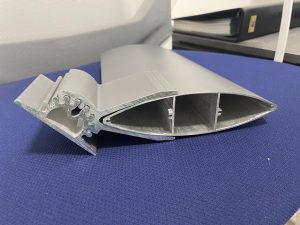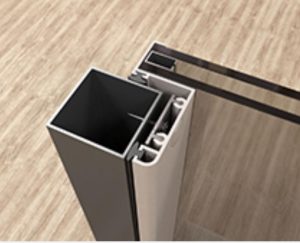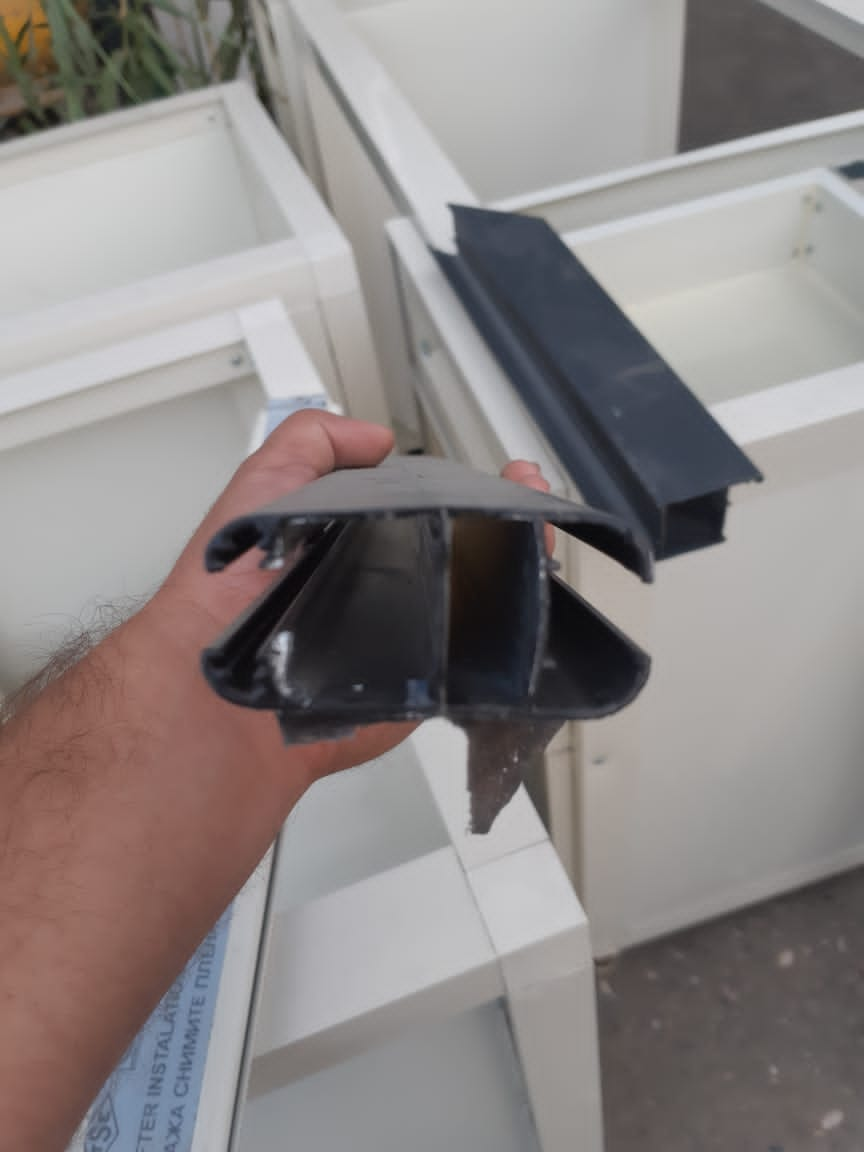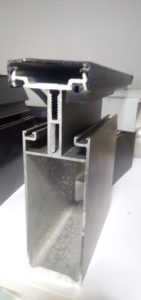Powder-coated aluminum
is actually the process of applying a protective finish to aluminum surfaces. Powder coating is a popular method for providing a durable and attractive finish to aluminum panels.
Here’s how the powder coating process typically works for aluminum:
1. Surface Preparation:
The aluminum surface is thoroughly cleaned to remove any dirt, grease, or other contaminants. This step ensures proper adhesion of the powder coating.
2. Curing:
The coated aluminum is then heated in an oven, causing the powder particles to melt and fuse together, forming a smooth and durable finish. The curing process typically involves temperatures around 300 to 400 degrees Fahrenheit (150 to 200 degrees Celsius).
3. Powder Application:
Fine particles of dry powder coating material are electrostatically charged and sprayed onto the prepared aluminum surface. The charged particles adhere to the aluminum, creating a uniform and even coating.
4. Cooling and Inspection:
After the curing process, the aluminum is allowed to cool down. Once cooled, the coated surface is inspected for quality, ensuring proper thickness, adhesion, and overall appearance. 
There are also some benefits to this kind of coating:
1. Durability:
Powder coating creates a tough and resilient finish that is resistant to scratches, chipping, fading, and corrosion, It helps protect the aluminum from environmental factors and extends its lifespan.
2. Aesthetics:
Powder coating offers a wide range of color options and finishes, allowing for customization and achieving a desired appearance. It can provide a smooth, glossy, or textured finish, enhancing the visual appeal of the aluminum.
3. Environmental Friendliness:
Powder coating is an environmentally friendly coating method. The powder coating material does not contain harmful solvents or volatile organic compounds (VOCs), minimizing air pollution. Additionally, excess powder can be collected and reused, reducing waste.
4. Easy Maintenance:
Powder-coated aluminum surfaces are relatively easy to clean and maintain. They are resistant to fading, staining, and discoloration, requiring only mild cleaning agents and routine care to keep them looking their best. 
Some other important improvements that are possible due to powder coating process:
1. Process Versatility:
Powder coating allows for a high degree of customization. Not only can you choose from a wide range of colors, but you can also select different finishes such as matte, gloss, metallic, textured, or even special effects like veins or wrinkles, This flexibility allows for creative design options and the ability to match specific project requirements.
2. Thickness and Coverage:
Powder coating can be applied to aluminum surfaces in various thicknesses, depending on the desired level of protection and appearance. The coating thickness can range from a few microns to several millimeters, providing excellent coverage and ensuring long-lasting performance.
3. Improved Resistance:
Powder-coated aluminum exhibits excellent resistance to various environmental factors. It is highly resistant to UV radiation, which helps prevent color fading and degradation over time, The coating also provides protection against moisture, chemicals, abrasion, and impact, making it suitable for both indoor and outdoor applications.
4. Enhanced Safety:
Unlike liquid paints, powder coatings do not contain volatile solvents that can be harmful to human health or release toxic fumes during application. This makes powder-coated aluminum a safer option for workers and end-users. Additionally, powder coatings are non-flammable, further contributing to their safety benefits.
5. Cost-Effectiveness:
Powder coating is generally considered a cost-effective finishing method for aluminum surfaces, The process is efficient, with minimal waste, as unused powder can be collected and reused. Additionally, the durability of powder-coated aluminum reduces the need for frequent maintenance, repairs, or recoating, resulting in long-term cost savings.
6. Green and Sustainable:
Powder coating is an environmentally friendly choice. As mentioned earlier, it contains no harmful solvents or VOCs, contributing to air quality preservation. Furthermore, the excess powder can be collected and recycled, minimizing waste and reducing the overall environmental impact.
7. Wide Range of Applications:
Powder-coated aluminum finds applications in various industries and sectors. It is commonly used in the construction industry for architectural elements like windows, doors, curtain walls, and railings, It is also prevalent in the automotive industry for parts such as wheels, grilles, and trim, Other applications include furniture, lighting fixtures, appliances, electronics, sporting goods, and more.
 There are also some common challenges or considerations when it comes to surface preparation for powder-coated aluminum:
There are also some common challenges or considerations when it comes to surface preparation for powder-coated aluminum:
1. Cleaning and Degreasing:
Proper cleaning and degreasing of the aluminum surface are crucial to ensure good adhesion of the powder coating, Any contaminants like dirt, oil, grease, or oxidation need to be thoroughly removed, However, aluminum surfaces can be prone to oxidation, which forms a thin layer of aluminum oxide on the surface. This oxide layer can interfere with adhesion, so it’s important to use appropriate cleaning methods to remove it effectively.
2. Surface Roughness:
The surface of aluminum should be adequately prepared to promote good powder adhesion. If the surface is too smooth or has a polished finish, it may require additional mechanical or chemical etching to create a rougher texture that promotes adhesion, On the other hand, if the surface is too rough or has deep scratches, it may require additional steps to smoothen and repair the surface before coating.
3. Conversion Coating:
In some cases, a conversion coating process is employed to enhance adhesion and corrosion resistance, Conversion coatings like chromate conversion coatings or phosphating can be applied to the aluminum surface before powder coating,
These coatings create a thin layer that chemically reacts with the aluminum, improving adhesion and providing a protective barrier against corrosion.
4. Aluminum Alloy Considerations:
Different aluminum alloys can have varying surface characteristics and compositions, which may affect the adhesion and performance of the powder coating. Some alloys may require specific surface preparation methods or primers to ensure optimal adhesion and durability. It is important to understand the specific requirements of the aluminum alloy being used and consult with coating experts or manufacturers for guidance.
5. Contamination Prevention:
After surface preparation, it is important to prevent recontamination of the aluminum surface before powder coating. Any contact with oils, fingerprints, dust, or other contaminants can compromise the coating’s adhesion and overall quality. Proper handling procedures, such as wearing gloves and using clean tools, as well as maintaining a clean environment, are essential to prevent contamination.
6. Surface Profile Measurement:
Achieving the right surface profile or roughness is important for optimal adhesion of the powder coating. Surface profile measurements can be performed using techniques like profilometers or visual inspections with test panels. Monitoring and maintaining the desired surface profile throughout the preparation process is crucial to ensure consistent coating quality. Overall, this is a very efficient way for coloring aluminum profiles in industry and it has some magnificent improvements on the profile itself. 
our offers
Types and examples of curtain wall construction and execution Building Facade|facade engineering|facade materials Ceramics Facades|Handrails|Terracotta Facade|Thermowood WPC Wood Plastic|facades glass|dryfacade (Aluminum Louvers)
Detailed technical and executive information for those interested Also, Here are some of the capabilities of this company:
aluminum company producer factory in Manufacture aluminum
such as profile windows & door aluminum
Details of the Valid Aluminium Company of factory products
Curtain Walls|Frameless glass facade|Aluminum louver
Skylight glass|Dry ceramic|Dry stone|aluminum profile


 There are also some common challenges or considerations when it comes to surface preparation for powder-coated aluminum:
There are also some common challenges or considerations when it comes to surface preparation for powder-coated aluminum: